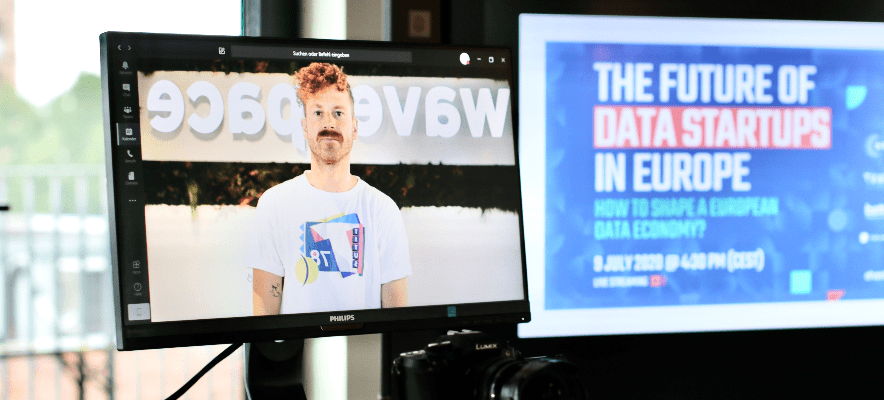The Future of Data Startups in Europe and how to shape a European Data Economy – ”We should get rid of all the fear to use data”
04. August 2020
Many of the most groundbreaking technologies of our time (e.g. Deep Learning) require access to huge amounts of data to reach their full potential. On a global scale, many countries globally have recognized that the handling and processing of these large data sets depend heavily on the agile innovation engines of our economies – the startups. Europe, in particular, has created an early link between Big Data and startups by launching state-funded incubation programs such as the European Data Incubator years ago. But what will the future of Big Data in Europe look like and what are the roles of European startups in shaping a European data economy?
The European Data Incubator (EDI) is an 8-month incubation program for Big Data startups bringing together data providers (corporates) and solution providers (big data startups) to further develop big data analytics in Europe. Former company builder etventure executes EDI among others and recently hosted the EDI Demo Day, the closing event of the second round of incubation.

To fully address this complex challenge, the European Data Incubator and etventure invited to a virtual event discussing the future of Big Data in Europe and the role of European startups out of the premises of wavespace Berlin. One of the most renowned AI and Big Data experts in Europe, Fabian Westerheide, as well as the top eight European Data Incubator (EDI) startups of the incubation phase 2019/20, provided an overview of the current situation and shared a wide range of aspects and insights to tackle this pressing concern. In the following, we want to review the many revealing insights and elaborate on what we need to establish a strong data economy in Europe.
When approaching Big Data, there is no way around its global significance and implications! For this reason, keynote speaker Fabian Westerheide first introduced AI and Big Data on a global level. China plays a leading role in this, being the world leader in this field and constantly proving to be the number one AI superpower. A central driver of the Chinese dominance in the fields of AI and Big Data is the high willingness of Chinese investors to invest in both technologies. With the words “Chinese investors are simply bold” Fabian Westerheide describes that 38% of all global capital invested in AI goes to Chinese startups. The use of innovative technologies such as AI in schools, for instance, shows what status Big Data in China generally reaches. Although the USA might not rank on the same level as China, the economy has successfully managed to align its startup ecosystem to the challenges of big data in similar ways. Not only because these regions are now experiencing enormous economic growth Europe is under pressure to act. So let us take a closer look at Europe.
“We should get rid of all fear to use data!”, Fabian Westerheide states. In his opinion, Europe already has great advantages due to its foundation of an established industry, cultural diversity and a gigantic pool of knowledge. “You could say that everything is ready. We just have to handle it the right way!”, Westerheide continues. So now it’s up to us to develop and implement a strategy that makes effective use of all opportunities and benefits and ensures an open and flourishing environment for Big Data as it is being developed in the USA or China. Well, and here we come to a crucial point: The question of what Europe’s strategy for Big Data is. In retrospect, Europe has so far been more concerned with mitigating risks than with actively generating opportunities. Westerheide is convinced: “Regulation should aim for protecting us and not for keeping us small” and adds that, of course, Europe must have data protection, but in a new and enhanced form so that the economy can flourish.

“Give our startups time and capital to grow until they are ready to compete!”, Fabian Westerheide calls out everyone and leaves the stage to the top eight startups of the European Data Incubator (EDI). The acceleration and ecosystem program EDI embraces a more collaborative use of big data and an overall multilateral approach to innovation. The EDI concept drives the digital transformation for larger corporations that are sitting on large data sets but are limited in their capabilities to develop new digital products. Startups, on the other hand, can work quickly, to try things out easily and to innovate continuously. Combining the strengths of both parties creates not only a successful partnership but also sustainable innovation.
Let us quickly introduce you to the top eight EDI startups:
- ORBEM improves life with AI-powered sensor technology. It builds a sustainable future, where food production is so efficient that it is possible to feed everyone, without depleting tomorrow’s resources.
- Tvarit GmbH is based in of Frankfurt and has developed an AI platform for sensor-data analytics for smart manufacturing, smart machines and digital transformation in the retail industry.
- Bettair Cities is an IoT platform that facilitates the local air and noise pollution forecast in cities based on accurate gas sensors and an advanced post-processing algorithm – already applied in 73 locations in 13 EU countries.
- Waterjade: “How much water is there and when will it become available?” Thanks to the integration of in-situ data, satellite images and numerical weather predictions, Waterjade provides the most accurate prediction of water flow.
- Feelingstream is a customer service analysis tool for large corporations that can help to skyrocket their sales revenue, creating customer insights in real-time. Over the last 18 months, they were able to transcribe 600.00 hours of phone calls.
- Sensei: A solution that redefines retail by removing all friction from stores and turning them autonomous and checkout-free. Through an integrated system of cameras and Artificial Intelligence algorithms, Sensei enables a new era of autonomous stores.
- SMAP Energy: Smart Meter Analytics Platform is a SaaS solution to transform the growing amount of smart-meter data into actionable business value. Another innovative solution that grew with EDI and is now being recognised worldwide!
- Aindo: A startup whose mission is to use state-of-the-art tools and techniques from Artificial Intelligence and Machine Learning to optimize business operations, combining corporate experience with academic excellence.

“With the help of EDI we unleash the power of data”, says Dr Miguel Molina Romero, co-founder of the EDI startup ORBEM. In the subsequent part of the event, the pitches of the different data solutions of the EDI startups gave us more concrete approaches to Big Data and – through their first-hand insights – additional aspects of how to shape a future-ready Data Economy.
To wrap it up. This is what a strategy should cover:
- The topics “Big Data” and “AI” must be brought closer to the public. Societies should be educated about these two technologies so that the fear of the unknown decreases.
- Secondly, we are lacking the necessary infrastructure for building strong Big Data ecosystems. Each country and Europe at large need to intensify their investments in technologies, which might trigger a quantum leap in the broad technological landscape (e.g. quantum computing or advancements in CPUs).
- Furthermore, there has to happen a change in taxation. Companies like Google and Amazon use our data but don’t pay any taxes for it. At the same time, startups waste much of their valuable time and resources on our sophisticated tax system.
- We need to open the market for talents from all around the world. Attracting the smartest people in the world to live and work here.
- Finally, startups need access to vital resources (e.g., data or capital). Hence, established players should see the benefits of providing data and money to startups, or governments should take initiative, e.g. via startups support programmes.
The European Data Incubator is a good example of how we need to rethink collaboration between different actors in the economy. A European data economy requires a collaborative ecosystem that stimulates free access to data and knowledge. “We should get rid of all the fear to use data!”
If you have not watched the event stream yet or want to watch it again, you can still dive into it here.





* Required field